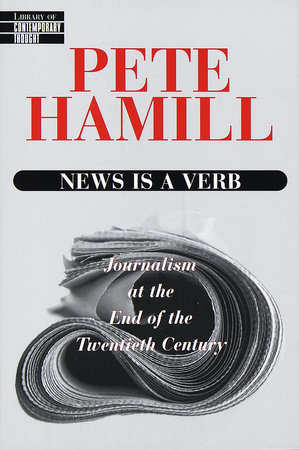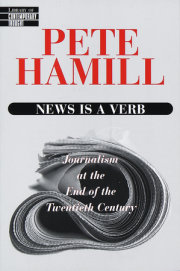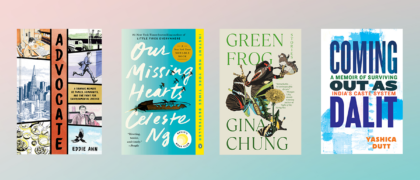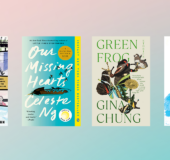This is not an objective or neutral essay. The subject is so deeply
entwined with my life that I can't write about it in a cold, detached
manner. Quite simply, I love newspapers and the men and women who make
them. Newspapers have given me a full, rich life. They have provided me
with a ringside seat at some of the most extraordinary events in my time
on the planet. They have been my university. They have helped feed, house,
and educate my children. I want them to go on and on and on.
The newspaper that gave me my life was the
New York Post, as
published by a remarkable, idiosyncratic woman named Dorothy Schiff and
edited by a tough, smart, old-style newspaperman named Paul Sann. I
started there on June 1, 1960, working the night side as a reporter. The
Post was then, and is now, a tabloid. That blunt little noun
has a pejorative quality these days, but "tabloid" really is a neutral
word, describing the shape of the page. "Tabloid" can't, with any
accuracy, describe the style, content, or intentions of
Newsday, the
National Enquirer,, the
Rocky Mountain News, the
New York Daily News, the
Boston Herald, the
Star, the
New York Post, the
Philadelphia Daily News, or the
Globe. All are published in tabloid format. But the
Star, the
National Enquirer, and the
Globe are supermarket weeklies, whose basic goal is to entertain their readers, usually with tales of celebs-in-trouble. The rest are dailies, engaged in the
traditional effort to inform their readers about their city, their nation,
and the world. All tabloids are different, shaped by separate traditions
and geographies. The daily newspapers that have endured--tabloid or
broadsheet--are those that best serve the communities in which they are
published. But the supermarket weeklies don't serve communities; they are
national publications driven by an almost primitive populism. Like the
mass-circulation Fleet Street tabloids that are their models, they are
really about class. Their unsubtle message is as primitive as an ax:
Don't feel so bad about your life, lady, these rich and famous people are
even more miserable than you are.
So there are tabloids, and there are tabloids. I'm proud to have spent
most of my working life as a tabloid man at the
Post, the
New York Daily News, and
New York Newsday. At the
Post, I served my apprenticeship--covering fires and murders,
prizefights and riots--and did so in the best of company. Reporters in
those days were not as well educated as they are now. Some were
degenerate gamblers. Some had left wives and children in distant towns,
or told husbands they were going for a bottle of milk and ended up back on
night rewrite on a different coast. Some of them were itinerant boomers
who worked brilliantly for six months and then got drunk, threw a
typewriter out a window, and moved on. Some were tough veterans of the
depression and World War II and were sour on the whole damned human race.
But all of them were serious about the craft. And oh, Lord--were they fun.
It was their pride that they could turn out a fine, tough, tight newspaper
with a fifth of the staff of the
New York Times, and do it
with great style. Let the
Times be the New York Philharmonic;
they were happy to play in the Basie band. They understood, and accepted,
the limitations placed upon them by the tabloid format. Because space was
very tight, every word must count. The headlines must sparkle. The
photographs must add to the story, not simply illustrate it. And every
story must have a
dramatic point. There was no room for
detailed analysis of the collapse of manufacturing in New York; you had to
find a factory that was closing and a proud man or woman who might never
work again. You couldn't just report a fire; you had to tell us about the
people whose baby pictures and wedding albums had gone up, literally, in
smoke. You had to look for good guys and bad guys, whenever they existed,
and then save them from being cartoons with skepticism and doubt.
Sometimes they slopped over into sentimentality or its twin brother,
sensationalism, by expressing emotions they didn't feel. Most of the
time, they were content to adopt a hard-boiled cynical manner, accompanied by a
wink.
All of them were conscious of their limitations; they knew that they never
once had turned out an absolutely perfect newspaper, because the newspaper
was put out by human beings. But in their separate ways, they tried very
hard never to write anything that would bring the newspaper shame. They
would be appalled at the slovenly way the word "tabloid" is now used.
They didn't pay whores for stories. They didn't sniff around the private
lives of politicians like agents from the vice squad. Even in large
groups, on major stories, the photographers didn't behave like a writhing,
snarling, mindless centipede, all legs and Leicas, falling upon some poor
witness like an instrument of punishment. Somehow, they found ways to get
the story without behaving like thugs or louts.
Copyright © 1998 by Pete Hamill. All rights reserved. No part of this excerpt may be reproduced or reprinted without permission in writing from the publisher.








